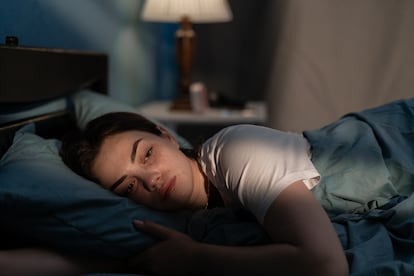A lack of sleep affects our emotions, we become less positive and more anxious
A meta-analysis synthesizes 50 years of sleep deprivation research and reveals that not enough rest can lead to emotional changes the next day

A recent sleep analysis survey, conducted by 40dB for Cadena SER and EL PAÍS, shows that almost half of Spanish adults do not sleep well on a daily basis and most do not get as many hours of sleep as they would like. The data coincide with those provided by the Spanish Federation of Sleep Medicine Societies, according to which 10% of the Spanish population suffers from some degree of sleep disorder and another 30% wake up every day with the feeling of not getting a good night’s sleep or end the day feeling extremely tired.
Given the information at hand, it is not surprising that sleep problems are increasingly becoming an issue that is also keeping us awake at night as a society. There is mounting scientific evidence demonstrating the link between chronic sleep deficit and the development of numerous diseases, including obesity, diabetes, cardiovascular disease, neurodegenerative diseases and certain types of cancer.
A major meta-analysis has recently been published in the scientific journal of the American Psychological Association which has synthesized more than 50 years of research on sleep deprivation and its effect on our mood. The result is unequivocal. All forms of sleep loss (total sleep deprivation, partial sleep loss, and sleep fragmentation) cause emotional alterations the next day. The strongest and most consistent effects are a reduction in positive mood and increased anxiety levels.
“The results of the study are significant because they reflect what happens to many people in everyday life. For example, new parents may wake up frequently to feed their children, or people may experience their sleep temporarily affected by noises during the night, which changes the structure and cohesion of their sleep without necessarily altering the duration of it,” explains Joanne Bower, author of the study and researcher at the University of East Anglia (Norwich, United Kingdom).
The scientist points out that previous research has already demonstrated that when we are short of sleep, the connections between the emotional regions of our brain and the areas that should help us to control these emotions are reduced. The novelty of this meta-analysis is that it indicates that this association occurs even after losing only one or two hours of sleep in one night. Even then, a decline in positive mood and an increase in anxiety were observed in the participants. “Emotions govern virtually every aspect of our day-to-day lives, so depriving ourselves of sleep seems to be the best way to choose the worst possible driver,” says Bower.
Psychologist Nuria Roure, a member of the Insomnia working group of the Spanish Sleep Society, stresses that the research results validate what specialists observe every day in their practices. “Emotional imbalance is, together with physical fatigue, the most frequently reported symptom in the consultation room,” underlines the author of the book Por fin duermo (Finally I can sleep). This expert welcomes the fact that more and more research is focusing on the emotional impact of sleep deprivation, an aspect that is generally less studied than the relationship between rest and certain pathologies.
Roure explains that if emotions were the pedals of a car, a good rest would allow for the correct balance between the use of the accelerator and the brake. However, a lack of sleep would be the equivalent of driving without brakes: “When we do not sleep well, we are more driven by our most primitive instincts and less by the more rational part of our brain, which is why we tend to act more impulsively, to lose our temper, to feel more anxious, to eat more high-calorie foods or to binge-watch TV series.” According to the psychologist, the problem is that we often enter a vicious circle with regard to our emotional health. If we sleep too little, the next day we are more sensitive to emotions and we generate higher levels of anxiety. When the night comes again, this will make us sleep worse because our brain does not disconnect, which means we will be even more tired the next day. It goes on and on in an infinite loop. This circular mechanism would explain why insufficient sleep, according to one study, is one of the main predictors in the process of burnout.
In the long term, mental health suffers the most
As Joanne Bower explains, the meta-analysis only analyzed the immediate (next-day) effects of sleep deprivation upon emotional health. Therefore, the long-term effects remain to be studied, although the scientific evidence is quite clear: prolonged periods of sleep deprivation could be associated with worsened mental health in the long term. “Exploring whether this is related to changes in our emotional functioning due to sleep loss represents an important future avenue for research,” suggests the British scientist.
Her view is shared by Francesca Cañellas, psychiatrist at the Multidisciplinary Sleep Unit of the Son Espases University Hospital in Palma de Mallorca (Spain), who adds that scientific evidence points to a bidirectional relationship between sleep disorders and mental health problems: “It is estimated that eight out of ten patients presenting with mental disorders during the acute phase and about three out of ten during follow-up have insomnia. Other studies have also shown that insomnia precedes depression.”
The expert believes that the data from this meta-analysis should be taken into account by political regulators with a view to taking measures to prioritize the rest the population gets and encourage more rational use of timetables. According to Cañellas, this is especially important in the case of the adolescent population, whose school and extracurricular timetables lead them to experience chronic sleep deficits.
“These kinds of well-grounded articles should have an impact on policy, because we are already seeing the horrific mental health epidemic affecting young people. And yes, it’s all very well to hire more psychiatrists and psychologists, but perhaps investing in prevention would be much better,” she adds.
In the same vein, Nuria Roure points out the need to invest in the training of medical professionals in cognitive-behavioral therapy, “which has been proven to improve sleep the most and in the long term.” According to the psychologist, medication can be helpful at first (“as support in those moments when we are emotionally overwhelmed”), but then non-pharmacological therapies are needed to treat the problem of sleep deprivation at its root: “Otherwise, we will wind up as we are now, as world leaders in the consumption of benzodiazepines, anxiolytics and hypnotics, which are ineffective in the long term because the underlying problem persists.”
Joanne Bower believes that this and other studies support the idea that improved sleep should be a public health priority and be promoted in the same way that healthy eating and regular exercise are. “If we can help improve the population’s sleep wellness, this will likely improve many other aspects of physical and mental health and wellbeing,” she concludes.
Sign up for our weekly newsletter to get more English-language news coverage from EL PAÍS USA Edition
Tu suscripción se está usando en otro dispositivo
¿Quieres añadir otro usuario a tu suscripción?
Si continúas leyendo en este dispositivo, no se podrá leer en el otro.
FlechaTu suscripción se está usando en otro dispositivo y solo puedes acceder a EL PAÍS desde un dispositivo a la vez.
Si quieres compartir tu cuenta, cambia tu suscripción a la modalidad Premium, así podrás añadir otro usuario. Cada uno accederá con su propia cuenta de email, lo que os permitirá personalizar vuestra experiencia en EL PAÍS.
¿Tienes una suscripción de empresa? Accede aquí para contratar más cuentas.
En el caso de no saber quién está usando tu cuenta, te recomendamos cambiar tu contraseña aquí.
Si decides continuar compartiendo tu cuenta, este mensaje se mostrará en tu dispositivo y en el de la otra persona que está usando tu cuenta de forma indefinida, afectando a tu experiencia de lectura. Puedes consultar aquí los términos y condiciones de la suscripción digital.









































